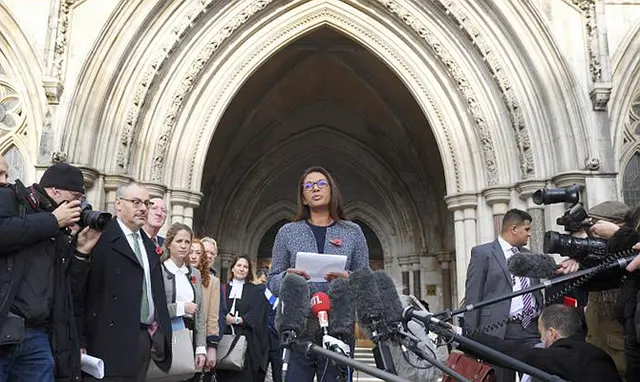A British court ruled on Thursday that the government needs parliamentary approval to start the process of leaving the European Union, potentially delaying Prime Minister Theresa May's Brexit plans.
The government said it would appeal against the High Court ruling and Britain's Supreme Court is expected to consider the case early next month.
A spokeswoman for May said the prime minister still planned to launch talks on the terms of Brexit by the end of March and added: "We have no intention of letting this derail our timetable."
The pound, which fell sharply after Britons voted to leave the EU by 52 to 48 percent on June 23, rose after the ruling.
Many investors took the view that lawmakers would now be able to temper the government's policies, making it less likely that the government would opt for a "hard Brexit" -- a scenario in which it prioritizes tight controls on immigration over remaining in the European single market.
The High Court ruled that the government needs parliament's backing to trigger Article 50 of the EU's Lisbon Treaty, the formal step needed to start the process of exiting the bloc.
"The most fundamental rule of the UK's constitution is that parliament is sovereign," said Lord Chief Justice John Thomas, England's most senior judge.
Thomas and two other senior judges did not spell out in their ruling whether the government would need to pass a new law to begin the divorce proceedings, but Britain's Brexit minister David Davis said this was likely if the Supreme Court upheld the decision.
"The judges have laid out what we can't do and not exactly what we can do, but we're presuming it requires an act of parliament," Davis told BBC TV.
Gina Miller speaks outside the High Court following its ruling on a challenge to the British government's right to start divorce proceedings from the European Union, in central London November 3, 2016.REUTERS/Toby Melville
Uncertainty
Parliament could in theory block Brexit as most lawmakers (MPs) supported staying in the EU in a referendum in June. But few observers expect that outcome, and a Reuters survey last month suggested MPs would back Brexit now.
Even so, the court ruling makes the already daunting task of taking Britain out of a political and trading club it joined 43 years ago even more complex.
"The negotiations haven't even yet begun. There will be uncertainty, there will be volatility around those negotiations as they proceed, and I would view this as one example of that uncertainty," Bank of England Governor Mark Carney said.
Economists at Deutsche Bank told clients May had been weakened by the ruling and was likely to have to call a general election next year.
But May's spokeswoman dismissed the suggestion. "Our position has been clear that there shouldn't be an election before 2020 - that remains the prime minister's view," she told reporters.
Trade minister Liam Fox told parliament the government was disappointed by the ruling but the government remained "determined to respect the result of the referendum".
May had said she did not need parliament's approval for triggering Article 50 under a historical power of "royal prerogative" where ministers act on behalf of the monarch.
The High Court rejected that argument and the judges granted the government permission to appeal to the Supreme Court, Britain's highest judicial body, which has set aside Dec. 5-8 to deal with the case.
Jeremy Corbyn, leader of the opposition Labour Party, said his party respected the outcome of the referendum but that the government's negotiating strategy needed parliamentary scrutiny.
Dominic Grieve, lawmaker from May's ruling Conservatives and a former British attorney general, said passing legislation to trigger Article 50 need not delay the process.
"It doesn't necessarily mean that it would hold it up for a very long time," he told BBC TV.
(REUTERS)
 简体中文
简体中文

